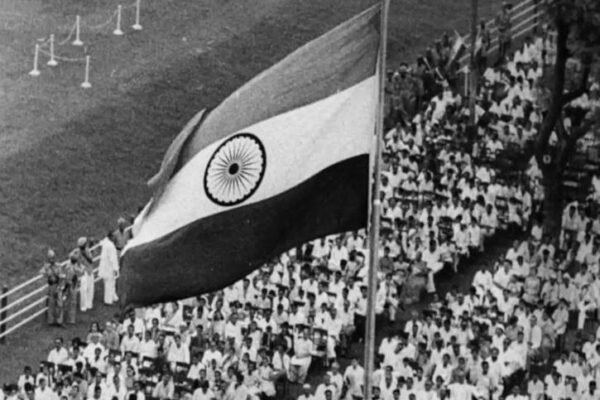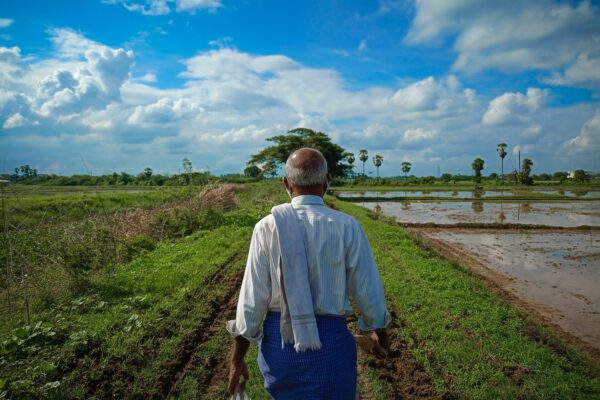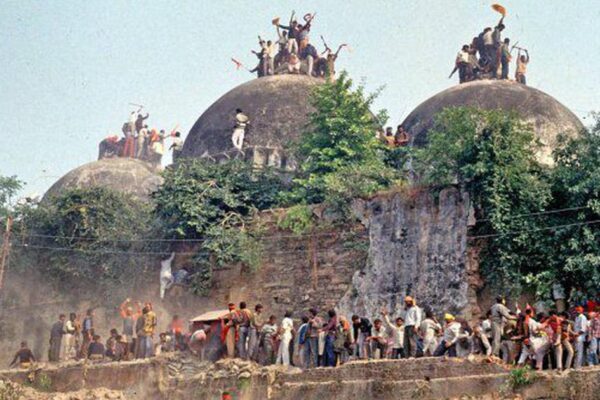“If seeking Azadi [freedom] is a crime, then I am ready to accept this crime and its consequences.”
“If seeking Azadi [freedom] is a crime, then I am ready to accept this crime and its consequences.”
Last month an Indian court sentenced prominent Kashmiri separatist leader Yasin Malik to two life sentences for charges including conspiracy against the state of India and receiving funds from Pakistan to support terror operations in Kashmir.
Clashes erupted as protestors gathered outside his home in Srinagar’s Maisuma locality and were subsequently teargassed upon by Indian forces.
The Prime Minister of Pakistan, the Organisation of Islamic cooperation, and Malik’s distraught wife, Mushaal Hussain, in Islamabad, fiercely condemned this move as an act of suppressing Kashmiri’s free will and depriving Kashmiris of their leadership.
So, who was Yasin Malik, and how did it all come down to this?
Moments ahead of the court trial in Delhi, the sister of JKLF chief Mohammed Yasin Malik recites Quran at her residence in Srinagar's Maisuma locality.
The court will decide the quantum of punishment for the JKLF chief at 4 PM today. pic.twitter.com/MkWQnH5M6F
— Qazi Shibli (قاضی شبلی) (@QaziShibli) May 25, 2022
Malik’s life as a young man in the streets of the capital Srinagar was like everyone else’s. He would witness the daily brutality and suppression that the Indian forces would perpetrate on the common people.
He, like other young students, was overtaken by a revolutionary spirit, and one day in 1980, when he witnessed Indian forces targeting unarmed taxi drivers, is said to be when he decided to become a rebel. He founded Tala Party and participated in various activities to cause general disturbances, especially in the Pro India National Conference gatherings.
In 1984, Maqbool Bhat, one of the first pro-freedom Kashmiri leaders, was hanged in Delhi’s notorious Tihar jail (the same place where Today Yasin is serving his life imprisonment) is when Yasin was first arrested. This would be the first of Yasin’s lifelong encounters with Indian Prisons.
After being released in 1986, the Tala party was renamed Islamic Students League, and Malik was elected its general secretary. It became a vital Youth organisation that collaborated closely with a socio-religious organisation, Jamaat-e-Islami.
A turning point in both Yasin’s life and Kashmiri’s history was the J&K Assembly elections of 1987. The central Indian government led by Indian National Congress had reached a consensus with the then head of the National Conference to enter the polls into an alliance to keep a tight grip over affairs in Kashmir. Another compromise to the Kashmiri free will was felt among the public, who were growing more discontent than ever.
Muslim United Front (MUF), an umbrella organisation of the various pro-self-determination/pro-freedom organisations, decided to contest the election as they believed that Farooq Abdullah-led government, in return for remaining in power, had decided to compromise Kashmir’s special status.
Malik Led Islamic Students League also joined MUF but decided not to run for any seats as they did not believe in the constitution – although they extensively campaigned for MUF all across Srinagar. They managed to capitalise on the pro-freedom sentiment among the people and created what is regarded by most as the most extensive electoral wave in Kashmir.
This, for the first and only time in the history of Kashmir valley, resulted in a massive voter turnout of 80 percent. To put these numbers into perspective, the last elections (for parliamentary seats) held in Kashmir in 2019 resulted in a turnout of 18 percent. MUF had well and truly created a wave in Kashmir.
Furthermore, what came after this was the most significant turning point. Blatant election rigging of the highest order, booth capturing, casting of pre-stamped ballots, and use of strong arms tactics allegedly initiated by Farooq Abdullah in connivance with the government of India took place.
Even after this, MUF had 31 percent of the recorded votes. Moreover, when all the malpractice was not enough, the MUF candidates were simply declared losers on seats they had still numerically won. An example of this was on Amira Kadal’s seat for Yusuf Shah, for whom Yasin had personally campaigned. These are all well recorded and accepted events, even later admitted by the winning party.
After the election, the Government of India arrested and tortured the MUF activists instead of punishing those responsible for the rigging. According to Bose, the number of activists arrested and tortured was in the hundreds and possibly thousands. Most of them were held in custody until late 1987 or 1988 without any formal charge. Among those activists arrested were Yasin Malik and Mohammad Yusuf Shah.
The General Secretariat of the Organization of Islamic Cooperation (#OIC) expresses it deep concern over the pronouncement of life sentence for one of the most prominent #Kashmiri leaders, Mr. #YasinMalik, who has been leading a peaceful freedom struggle for many decades. pic.twitter.com/3cn9IcEqub
— OIC (@OIC_OCI) May 27, 2022
Most experts regarded these events as the trigger point of the Kashmiri insurgency against India. Most of the rebel youth reached a boiling point and believed peaceful methods could no longer be successful.
After being released from prison, Yasin Malik, like many other Kashmiri youths, crossed to Pakistan-administered Kashmir and joined the Jammu Kashmir Liberation Front (JKLF) and trained to be an armed rebel. JKLF was established by Amanullah Khan in the United Kingdom a few years ago, but he moved to Pakistan-administered Kashmir in 1984 and established its Headquarters in Muzaffarabad. JKLF received support from the Pakistani administration.
Yasin Malik crossed back into Kashmir as the core member of the JKLF and, along with his comrades from Islamic Students League days, formed the famous HAJY group of JKLF. They waged guerrilla warfare against Indian security forces, including kidnapping the daughter of then Home Minister of India Mufti Mohammed Sayed and only returning her after freeing other pro-freedom militants held in Indian jails and attacking various government and security officials.
JKLF was pro-freedom and also opposed Pakistani rule of its parts of Kashmir, it soon fell out of favour, and it believed that Pakistan stopped funding them. As inspired by JKLF, Pakistan had created a pro-Pakistan militant group Hizb ul Mujahideen, which was believed to be sponsored inside the valley by the Jamaat e Islami.
In March 1990, Yasin Malik was captured in wounded condition as most of the JKLF militants were either killed or captured as the pro-Pakistan Hizb ul Mujahideen took over the insurgency. Yasin Malik was captured and jailed till 1994, when he was released on bail, and he decided to shun violence and adopted a non-violent Gandhian approach to the Kashmiri struggle.
He announced a JKLF ceasefire, although Amanullah Khan decided to revoke him from JKLF. Pakistan, in turn, recognised Yasin as the head of JKLF, which complicated the situation further, and JKLF split into two.
Malik would then continue to lead the peaceful struggle, and he still got arrested twice for almost a year between 1998 and 2002. He went on to have one-on-one meetings with the President of Pakistan and the Prime ministers of India and Pakistan. He famously launched a march known as Journey of Freedom in which he and JKLF workers went to over 3000 villages in Kashmir, promoting pro-freedom stances.
Indian Army Officer Charged For Killing Three Kashmiris In Staged Gunfight
Since the Hindu Nationalist government of Narendra Modi took charge in India, they started to tighten the noose against any pro-freedom peaceful activities in Kashmir. In 2019 they banned Jamaat Islami and declared it a criminal organisation.
The widespread arrests of Kashmiri leaders also started. Yasin and his close aides were booked, and a charge sheet was created against them by the national investigation agency of India for receiving funds from Pakistan to organise people’s mobilisation in 2010 and 2016. He was arrested along with various Kashmiri leaders.
The events were followed by the abrogation of article 370, after which all Kashmiri social leaders, including the pro-Indian ones, were imprisoned. In March next year, more charges were presented by the Indian agency against Yasin Malik, including those dating back to his armed days in1990.
In March 2022, after years of languishing in the Tihar jail, Malik pleaded guilty to all charges and decided not to contest the charges, which included terror funding and criminal conspiracy against the Indian state, in front of the tribunal of the Indian investigation agency. He decided not even to have a lawyer.
He was convicted by the court and given two life imprisonments and five ten-year sentences, all of which must be served concurrently.
Court verdict in minutes by Indian kangaroo courts. Yasin Malik is the bravest man to challenge the Hitler Modi of this Era !!! We r all Yasin Malik #ReleaseYasinMalik Pray for the Lion of Kashmiris ! The iconic leader will never surrender pic.twitter.com/Hv9VJqMivQ
— Mushaal Hussein Mullick (@MushaalMullick) May 25, 2022
His wife, a Pakistani citizen, called it a decision by a kangaroo court, and the Prime minister of Pakistan called it a Black Day for Indian democracy. JKLF released a statement terming the charges as fabricated and quoted Malik saying to the Indian court,
“If seeking Azadi [freedom] is a crime, then I am ready to accept this crime and its consequences.”
Sources
The Poster Boy of Separatism in Kashmir
Yasin Maliks Journey From Gun-toting Kashmir Rebel to Gandhism
Seeking Freedom Not A Crime: Mushaal Appeals World to Save Yasin Malik
Sending Yasin Malik Away For Life Wont Help India Solve The Problem Of Kashmir





